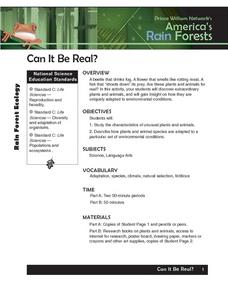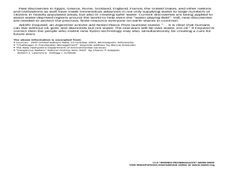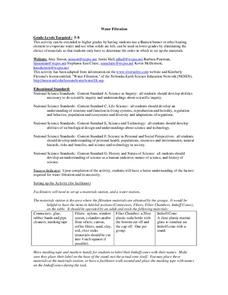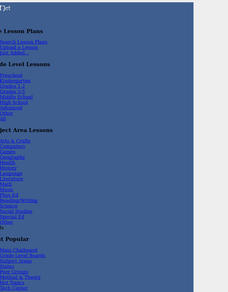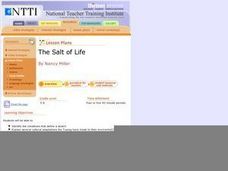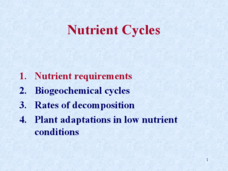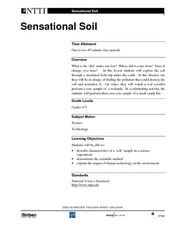Curated OER
Voyage to Kure Viewing Guide
Students complete a worksheet while viewing a video about the oceans. They locate the oceans on a map and identify positive and negative ways in which humans have impacted them. They discuss any questions at the end of the lesson.
Curated OER
To Culture or Not to Culture
Students study the pros and cons of the aquaculture industry after reading hypothetical case study. They simulate a town meeting debate about aquaculture.
Curated OER
America's Rain Forests Can It Be Real?
Students examine the attributes of unusual plants and animals before determining how they are adapted to specific habitat. They complete an associated worksheet. They make posters with information that they find during research sessions.
Curated OER
What is a National Forest
Students select and research a National Forest near their local community. They read and discuss the pamphlet "A Guide To Your National Forests," view photos of national forests, conduct Internet research, and complete the student...
Curated OER
Hydro-Technology
Students create a design for water collection, sanitation, or supply. In this hydro-technology instructional activity, students learn about the global water crisis. Groups of students read water technology articles, draw or design a...
Curated OER
Water Filtration
Learners investigate our water system and how it is filtered. In this science instructional activity, students perform a laboratory activity to investigate the process that goes into filtering water. They relate this activity to other...
Curated OER
First Contact
Sixth graders have an opportunity to enhance their computer skills by using Internet as a resource tool and a vehicle for global interaction with other students.
Curated OER
The Salt of Life
Young scholars identify and describe significant historical periods and patterns of change within and across cultures, such as the development of ancient cultures and civilizations, the rise of nation states, and social, economic, and...
Curated OER
Pika Chew
Students work in collaborative teams with specific roles, use the Internet to research the behavior and ecology of pikas, make predictions about survival rates of pikas in different habitats and organize their data in graphs.
Curated OER
Community Tree Contest
Students observe trees in their neighborhood. They practice tree identification and incorporate math skills to determine the winner of a 'Tree-mendous Tree' contest in which they determine which is the biggest tree.
Curated OER
Tornadoes
Students examine the characteristics of a tornado. They practice using new vocabulary and participate in a question and answer session. They use the internet to gather more specific information.
Curated OER
The Watershed Quest
Students examine their connection to local watersheds. They describe the water cycle and list species living in their local watershed. They also draw a map of their community.
Curated OER
Mock-Muck
Students purify water samples using various techniques. In this water treatment lesson, students complete a variety of activities to learn about the process. A data chart is included for recording results. A crossword puzzle is included...
Alabama Learning Exchange
Systems of the Human Body
Students research systems of the human body. In this biology lesson, students read the book Yucky Story and identify the systems of the human body. Students create a Powerpoint presentation to demonstrate their knowledge of the content.
Curated OER
And Then there Were Nun: Trees that could be endangered by the Nun Moth Invasion
Learners read and article and become familiar with the danger to trees from the Nun Moth. In this Nun Moth lesson, students work in groups to create visual images of vocabulary words. Learners reflect on the article by assessing...
Curated OER
Nutrient Cycling
AP environmental science or college-level ecology classes will glean a tremendous amount of information on nutrient cycles from this detailed PowerPoint. It covers nutrient requirements, biogeochemcial cycles, decomposition rates, and...
PricewaterhouseCoopers
Conservation: Water
Here is a fantastic experiment-based lesson on water conservation, waste, and filtration. The lesson plan is well-developed and provides background information, discussion leads, and six scripted lab activities anyone can do. The class...
PricewaterhouseCoopers
Waste and Recycling: Recycling and Energy Recovery
Reduce, reuse, recycle, and recover. Young environmentalists learn about the overwhelming amount of garbage produced and discover better ways to minimize their impact on Earth by learning the difference between garbage and...
Curated OER
Sensational Soil
Fourth and fifth graders explore soil by taking a simulated field trip under the earth. They go to an Internet site that runs a simulation which charges them with finding a source of pollution that could destroy all of Earth's soil, and...
Curated OER
Sustainable Agriculture: Soils And Food Production
Ninth graders recognize differences in soil quality from one area to another. They describe the importance of organic matter in soil health and suggest ideas that help provide adequate food supplies for the world. The interview a person...
National Wildlife Federation
Quantifying Land Changes Over Time in Areas of Deforestation and Urbanization
Is qualitative or quantitative research more convincing when it comes to climate change? In the eighth lesson during this 21-part series, scholars begin by performing a quantitative analysis of deforestation and urbanization. Then, they...
National Wildlife Federation
Quantifying Land Changes Over Time Using Landsat
"Humans have become a geologic agent comparable to erosion and [volcanic] eruptions ..." Paul J. Crutzen, a Nobel Prize-winning atmospheric chemist. Using Landsat imagery, scholars create a grid showing land use type, such as urban,...
Curated OER
Digital Video Lesson Plan: Brine Shrimp
Students participate in classroom experiment to gain better understanding of type of environment brine shrimp can best survive. Students then explore effects of common saltwater pollutants on survival of animals in sea.
NOAA
Vertebrates I
I spy a spine. The 19th installment of a 23-part NOAA Enrichment in Marine sciences and Oceanography (NEMO) program explores vertebrate species, such as sharks and other fish. Learners take part in an activity evaluating the...




